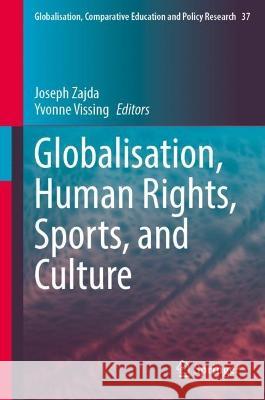Globalisation, Human Rights, Sports, and Culture » książka
topmenu
Globalisation, Human Rights, Sports, and Culture
ISBN-13: 9783031384561 / Angielski / Twarda / 2023
Globalisation, Human Rights, Sports, and Culture
ISBN-13: 9783031384561 / Angielski / Twarda / 2023
cena 603,81
(netto: 575,06 VAT: 5%)
Najniższa cena z 30 dni: 539,74
(netto: 575,06 VAT: 5%)
Najniższa cena z 30 dni: 539,74
Termin realizacji zamówienia:
ok. 22 dni roboczych.
ok. 22 dni roboczych.
Darmowa dostawa!
This book offers research findings of the different types of human rights issues that concern athletes and sports programs and the issue of how organizations are addressing safety and human rights issues. The study of sports has not typically been considered as a human rights field. In recent years it is clear that athletes have experienced a variety of human rights violations. As a result, many sports programs have been confronted with criminal violations of abuse and maltreatment. Some sports organizations are developing athlete bills of rights in response.
The book provides readers with an overview of the importance of human rights policies and practices in sports, and a synthesis of where the field of sport human rights could be developed. The chapters explores human rights in sports from both organizational and interpersonal approaches. There are both organizational and individual factors associated with human rights. There can be rights violations by coaches, trainers, doctors, or even other athletes. Violations can be physical, sexual, emotional, social, or financial. Organizational policies vary from being very equitable and rights-respecting to those that put athletes at risk or discriminate against them. This book is the first of its kind that links together sports and human rights in a systematic way.











